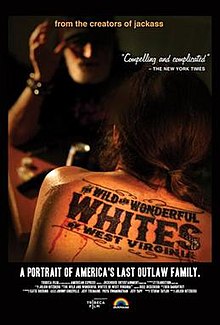|
The Wild and Wonderful Whites of West Virginia
The Wild and Wonderful Whites of West Virginia is a 2009 documentary film directed by Julien Nitzberg chronicling the White family of Boone County, West Virginia. SynopsisThe film follows the White family over the course of a year in their daily life through first-person interviews. The film mentions the details of the death of patriarch Donald Ray "D. Ray" White, as well as his rise to stardom as one of the most famous mountain dancers of his time. The illness of his widow, Bertie Mae White, is documented throughout the course of the film. Locals consider Bertie Mae "The Miracle Woman" because of her lifelong dedication to raising abandoned children. Throughout the film, Bertie is seen supporting her family despite her intolerance of their dangerous and reckless behavior. The younger generations of Whites are followed to drug deals, criminal trials, hospital beds, and jail cells to recount the wild and outlandish events in their lives. A group of local professionals in Boone County act as a Greek chorus as they speak about the Whites, mostly criticizing their negative influence on the community.[1] Stemming from generations of coal miners working in risky job conditions, most of the White family possesses a fatalistic attitude and lack a fear of death. Various members recall violent fights with neighbors, family members, and other locals. Other legal troubles include larceny, prescription fraud, shootings, armed robbery, forgery, stabbings, and child custody battles. D. Ray worked in the coal mines during the scrip payment era; Mamie explains how D. Ray's frustration with his employers' corrupt practices led him to "outsmarting the system." D. Ray legally signed each of his children up for "crazy checks" during their early adolescence. Mamie discloses to the audience that each month, she (and all the other offspring of D. Ray and Bertie Mae) receive social security checks monthly from the government due to their inability to hold employment because of alleged psychiatric disability.[1] The WhitesSix of D. Ray and Bertie's 13 children are featured in the film.[2] D. Ray and Bertie's children
Grandchildren/cousins
ProductionThe film, by Dickhouse Productions, was the first non-Jackass feature produced by Johnny Knoxville and Jeff Tremaine. Knoxville had been a fan of Director Nitzberg's documentary about Hasil Adkins, and of The Beastly Bombing. Having seen Nitzberg's early footage of Jesco White, Knoxville and Nitzberg convinced Nitzberg to return to West Virginia, in order to film a feature around the rest of the White family. Nitzberg spent eighteen months with the notorious family of Jesco White, documenting their history as dancers, criminals and the impact of the coal mining culture upon them. Shot cinéma vérité style, the film followed four generations of the White family as they flowed in and out of prison and scrambled to get by in rural West Virginia. The film also featured sequences featuring Jesco White tap dancing, accompanied by Hank Williams III.[6] Critical responseThe film debuted at the Tribeca Film Festival and was one of the first films distributed by Tribeca Film's distribution arm. It was an immediate success, knocking Best Picture Oscar winner, The Hurt Locker, from Amazon's top video-on-demand spot. It also aired on Showtime.[7] Upon release, Xeni Jardin of Boing Boing proclaimed it “a masterpiece.”[8] Chris Morris in Variety said “Drinking, gas-huffing, drug dealing and drug-taking (and rehab), brawling, infidelity, armed robbery, attempted murder, incarceration and parole – it's all here. The Whites make Faulkner's Snopeses look like the Royal Family.”[9] A.O. Scott in The New York Times reviewed it favorably, noting, “Its governing spirit, captured in the raucous music that punctuates the story (including songs performed live by Hank Williams III), is one of outlaw celebration. An anthology of country standards unfolds in real life and real time: murder ballads, cheating songs and rebel hollers, with an occasional pause for fatalistic spiritual meditation. One thing is certain, and is in a way the whole point of this fascinating and problematic documentary: The Whites don't care what you or anyone else thinks of them.”[10] On Rotten Tomatoes it has an approval rating of 60% based on reviews from 10 critics.[11] Soundtrack
See alsoReferences
External linksWikiquote has quotations related to The Wild and Wonderful Whites of West Virginia. |
||||||||||||||||||||||||||||||||||||||||||||||||||||||||||||||||||||||||||||||||||||||||||||||||||||||||||||||||||||||||||||||||||||||||||||||||||||||||||||||||||||||||||||||||||||||||||||||||||||
Portal di Ensiklopedia Dunia
